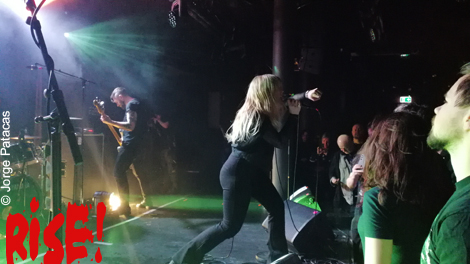by Jorge Patacas
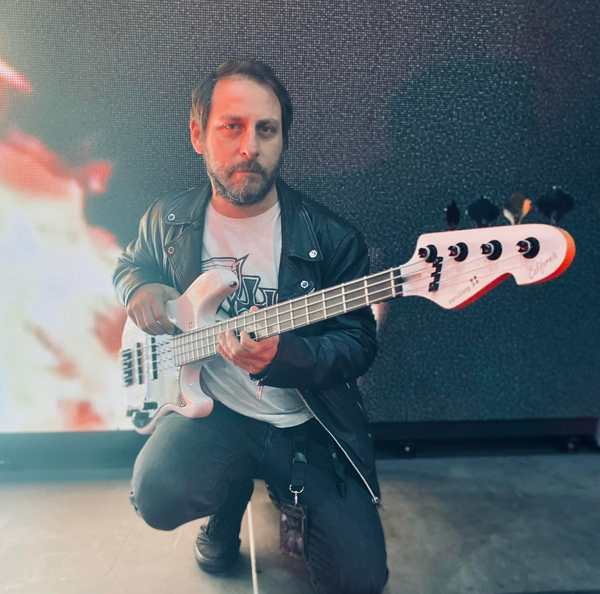
A new edition of the Beyond the Gates festival was held in the city of Bergen, Norway, last August. Opeth closed the second day and there we were able to interview Uruguayan bass player Martín Méndez, who has been in the band since 1997 after moving to Sweden. He has also recently formed a new band called White Stones in the city of Barcelona where he currently resides, and told us all the details about it as well as his beginnings, his decision to emigrate and much more!
RISE!: – Talking a bit about the last album you released with Opeth, “In Cauda Venenum”, from 2019. Why did you decide to do a version in Swedish and another in English?
Martín Méndez: The original idea was to do it in Swedish. The English version came up a bit later when the album was almost finished. It was a manager’s suggestion and also Mikael (Åkerfeldt, vocals/guitars) suggested doing it in English because we think Swedish is a very limited language, it’s only spoken in Sweden. It is not like Spanish that is spoken in many countries, so we think that many people would like to know what the lyrics are about and have the option of listening to the version they want. The music is exactly the same and the vocal melodies too, the only thing that changes is the phonetics, but for us the original version is in Swedish.
R!: – Having so many albums out now, what criteria do you guys use to put together the setlist? Do you all decide together?
MM: We talk about this before each tour and we all propose what songs we would like to play, and from the songs we suggest we try to create a good dynamic to come up with the setlist. Sometimes we would like to play certain songs that could break the dynamic a bit, so we try to prevent that from happening by deciding all together.
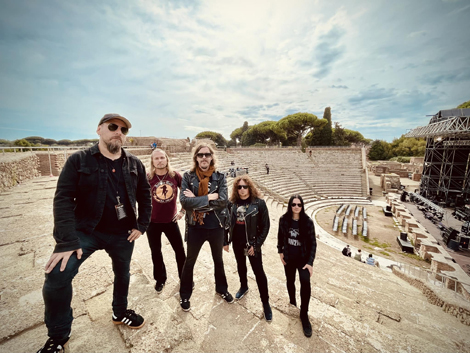
R!: – And what is the most complex Opeth song to play live in your opinion?
MM: That question is difficult to answer because there are song and songs. I can tell you, for example, a song like “Isolation Years” from “Ghost Reveries” which is a ballad. It’s a song that’s super simple, but as a band it’s a song that’s hard to make it sound like it’s supposed to. There is something musically that is not easy to make it sound good. It is very fragile so to speak. Then there are technical things that can also be challenging, but I think that in general we can play all the songs we’ve done, that’s why we also play them in the studio. We never do anything we can’t perform live. But perhaps the most challenging parts are the vocals, the harmonies can be a bit challenging and there we say that this song must be rehearsed more. But musically it never happened that a song didn’t sound good and we couldn’t play it.
R!: – Nowadays there are many bands that can’t reproduce what they do in the studio…
MM: Yes, but we are a group that plays live, we don’t have tapes or anything.
R!: – Tell us a bit about your side project White Stones with Spanish members. How did this idea come about?
MM: Usually with Opeth we take a year off between records and tours, and I’ve always written a bit of music, but I’ve never really done anything with it. This time, after the “Sorceress” tour, I started writing songs and came up with a couple of White Stones-esque songs. There I said “I’m going to start doing more songs”. I did up to six songs and I liked it, but by then I didn’t have a band name or anything. Even up to that moment I was going to sing because it was something I was going to do by myself, except for the drums that I was going to hire someone to record them, but when the time came to record everything for real, when I was going to sing I didn’t feel comfortable. I had sung in Eternal in Uruguay and later in Sweden I had two or three bands where I sang too, so it was a nostalgic moment and I wanted to try, but I didn’t feel comfortable. At the time I was living in a place where there was a studio, and my neighbor was the one who ended up being the singer in White Stones. I had asked him to give me a hand to record myself, I spent a few minutes trying it out and I told him to try it because I knew he sang well. He started to sing and we started throwing ideas around, and everything flowed super well and that’s how he ended up as the singer. It was without much planning, and when I finished it, I liked the result. I showed it to Opeth’s manager and he loved it, then he told me that he was going to find me a deal. That’s when things got serious.

R!: – And it was all super fast…
MM: Yes, super fast. When he got me a deal with Nuclear Blast, they asked me to do three or four more songs because it was too short. I wrote four more songs, recorded them and asked Fredrik (Åkesson, Opeth guitarist) to give me a hand with the guitar solos, and I had a couple of friends who played music near where I live, that’s why they are all Spanish. When I finished it I began to think about the name of the band. At that time I was in a nostalgic moment in my life, and I wanted to give a tribute to the old days, to the place where I come from, and White Stones is Piedras Blancas, the neighborhood where I lived during my childhood.
I wrote more than half of the lyrics on the first album and there’s one, for example, that is about my grandfather, but of course, it’s written in a way you don’t realize is about that. There are titles in Guarani, “Kuarahy”, “Guyra” and “Jasy”.
R!: – So there’s a lot of personal stuff.
MM: A lot of personal stuff and a tribute to Uruguay and the culture. The indigenous culture has always attracted me, which is why I tried to mix the Guarani a bit. Thus White Stones was born. The first album came out in 2020 and since I couldn’t play live or anything, I started making the second album right away. This second album (“Dancing into Oblivion”) is not so related to what I was telling you about nostalgia, I approached it from another side, but it’s still White Stones.
R!: – And the sun in the logo is from the Uruguayan flag, right?
MM: Sure, it’s the sun on the Uruguayan flag.
R!: – The whole idea of the second album started once the first one was released, but what was the inspiration for the second one?
MM: The inspiration came basically from what I felt inside. When I was writing, I let it flow, I didn’t have an idea of what I wanted to do, but I think that what was being experienced, the uncertainty of not knowing what was going to happen or the general fear of society had a great influence. This record has a bit of that.
R!: – You can see the creative moment you were going through. Nowadays it’s not that common that two albums are released so often.
MM: No, but the truth was that I had a lot of energy and it was time to take advantage of it.
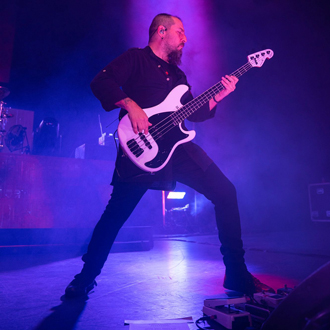
R!: – And you wrote both albums in their entirety, right? The lyrics too?
MM: On the second album I left the lyrics to the singer Eloi because I wanted him to put a little more of his part. Likewise, I talked about it with him and I kind of guided him to where I would like the lyrics to go, and well, it was a bit of this that was happening and maybe something political and social behind it. A bit like the way I grew up with metal, right? I wanted to capture that a bit. The guitars were also recorded by me.
R!: – Did you feel comfortable playing the guitar considering that you’ve been playing the bass for a long time?
MM: Yes, but I’ve been playing guitar for a long time too and by writing everything on guitar, I felt comfortable playing it. For the solos I had a guitarist named Joao Sassetti who I met in Barcelona, but he just moved to Portugal and couldn’t be on the recording because of the lockdown, he couldn’t travel to Barcelona. Since I had recorded all the guitars on the first album, I also recorded them now, and the recording was fast too.
R!: – Going back a bit in time, how old were you when you started playing the bass and what led you to decide for this instrument? Your father was a bass player, right?
MM: Yes, my father was a bass player. He he stopped playing when I was one year old, I think, and in my house in Piedras Blancas there was a bass on top of a closet. When I was around eleven years old, I got curious to see what that was, and he taught me my first lines, but of course, it was difficult for me because whene you’re eleven years old you have a small hand. I would grab it for a week and my head would go faster than my fingers, I would grab it the following week and try again, and I was like that for a year I think. From the age of twelve, when the hand had already adapted a little more, I began to be a little more serious there and from then on I never stopped.
R!: – And the first thing you recorded in the studio was what you did with Eternal or was there something before?
MM: Well, we had recorded some demos with Eternal as well. We recorded at home where we rehearsed. But if we talk about released demo, then it was that one with Eternal, yes.
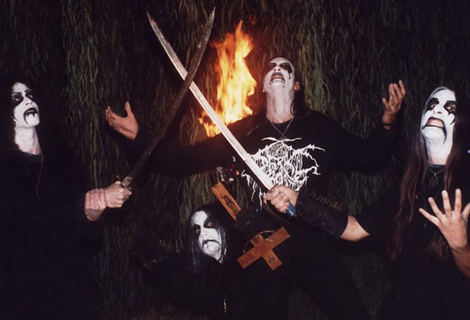
R!: – And what do you remember of that recording? You recorded that with Cristian Death (Cristian Montes de Oca), right?
MM: Yes, he was the one who gave us the idea of making this demo. It was great. Think about it, at that time we had played for a few years and recording something was like a dream. I don’t remember the name of the studio, but I do remember that the owner’s name was Guillermo, it was very small, but everything was incredible for us. It was a very nice experience and I have good memories. I also remember that all this was blood and sweat because when I was going to record the vocals I had just had a sore throat, but I had to sing because we didn’t have time. We had four days to record, it was the last day and there was no money to continue.
R!: – And how did you manage?
MM: By drinking water and taking honey pills. I was taking the pills and screaming. I left my throat on that demo (laughs)
R!: – These kinds of stories are amazing (laughs)
MM: Yes (laughs)
R!: – And what was the motivation for you to go to Sweden after that? Were you determined to go and try to have a career as a professional musician or what was it like?
MM: The only idea was to try with music, but my fantasy at that time didn’t go that far. I was 17 years old and coming from where I came from and having done what I did in Uruguay, my dream was to get to Sweden and record an album. If I achieved that goal, I was going to be the happiest man in the world. I didn’t think much more than that.
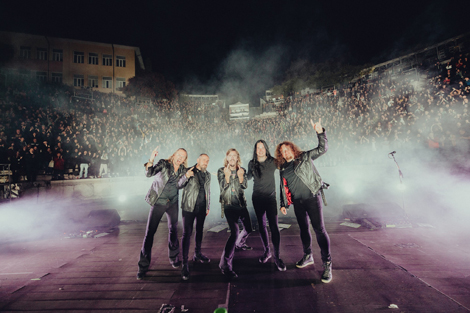
R!: Of course, you had no idea what came next…
MM: No, I wouldn’t have believed it. But the idea was to try with music, I had no other plans.
R!: – How difficult was it to leave the family behind at that age? Did you travel to Uruguay from time to time at that time?
MM: No, the first time I went on vacation to Uruguay was after five or six years living in Sweden. It was very hard, I’m not going to lie to you. The first year even more so, two or three times I was almost determined to return. I couldn’t stand being away from my family, from my country, from my culture. Sweden fascinated me because I listened to music and stories, and suddenly I got there and had rehearsal rooms in every neighborhood equipped with Marshall, things that didn’t exist in Uruguay. There were possibilities, but at the same time I was leaving my life behind, family more than anything. I was about to go back, but I always had something behind me that told me “hold on a little longer”, and ten months later I met the guys from Opeth. That was also something that helped me keep going.
R!: – Unbelievable how things turned out, right? But several years later, in 2012, you played with Opeth in Uruguay. What do you remember from that show?
MM: It was great. It is a dream come true to be able to return to your country and play. It was a pity that everything was so short though.
R!: – Were you there only for one day?
MM: Yes, it was only one day. I would have liked to show the rest of the members a little more of the country. We were in downtown, on 18 de Julio avenue, and we went to have an asado. I was also a bit lost because many years passed. I remembered the streets of the downtown, I used to go to a record store… one that was in a gallery, it was metal record store. Anyway, on the street I asked some metalheads who were going to the Opeth concert where we could eat a good asado, and they came with us, we went to Ciudad Vieja and ate a good asado. The concert was good because there were also many familiar faces, but it was all so short that I didn’t even have time to meet many friends. I hope it happens again.
R!: – Let’s hope so. Now you are living in Spain. Why did you decide to leave Sweden and move there?
MM: Because my partner was born there. We lived in Sweden for a couple of years, but she decided to come back and I also have children who were born there, so I have to be there.
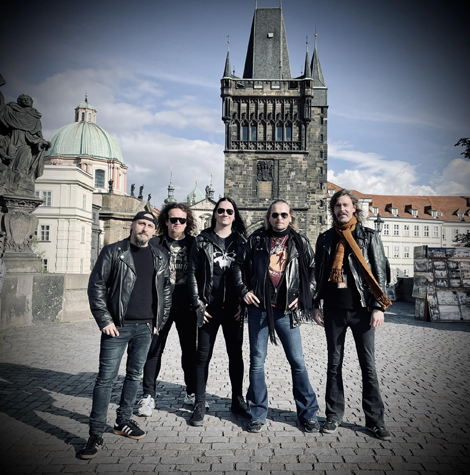
R!: – Coming back to Opeth, you have toured countless places throughout all these years, but is there still a special place you would like to visit?
MM: For example, South Africa is a place we’ve never been to. There are many bands that play there. It would be good. We have been to many places, but I have a good time in all of them. When it comes to playing, each continent has a different kind of audience, and it is appreciated in different ways. Playing in Japan has nothing to do with playing in South America or Europe, Norway has nothing to do with the United States and so on. But I like it and I enjoy it a lot, being on stage more than anything. The rest of the day on tour can be a bit heavy at times… the travelling, the waiting.
R!: – Do you still enjoy touring in the same way despite those things?
MM: Yes, I mean, it gets more difficult with age and having children, but playing is what we’ve done all our lives and when I’m on stage, I’m at home. It is the moment in which I forget everything.
R!: – To finish the interview, do you come up with ideas for new material during the tour as well or do you start with the process from scratch once the tour is over?
MM: Normally the writing starts when we’re at home, when the tour ends, but in the case of Opeth, it’s Mikael who writes 99% of the music. But what we do during the tours is talk a little bit about the idea of how it’s going to be. The idea is to record a new album next year, we don’t know when yet.
OPETH DISCOGRAPHY
Orchid – 1995
Morningrise – 1996
My Arms, Your Hearse – 1998
Still Life – 1999
Blackwater Park – 2001
Deliverance – 2002
Damnation – 2003
Ghost Reveries – 2005
Lamentations – Live at Shepherd’s Bush Empire (En Vivo) – 2006
Watershed – 2008
Heritage – 2011
Pale Communion – 2014
Sorceress – 2016
In Cauda Venenum – 2019
WHITE STONES DISCOGRAPHY
Kuarahy – 2020
Dancing into Oblivion – 2021
OPETH VIDEOS
“Harvest” (2001):
“The Grand Conjuration” (2005):
“Burden” (2008):
“The Devil’s Orchard” (2011):
“Universal Truth” (2019):
WHITE STONES VIDEOS
“Worms” (2020):
“Chain of Command” (2021):

